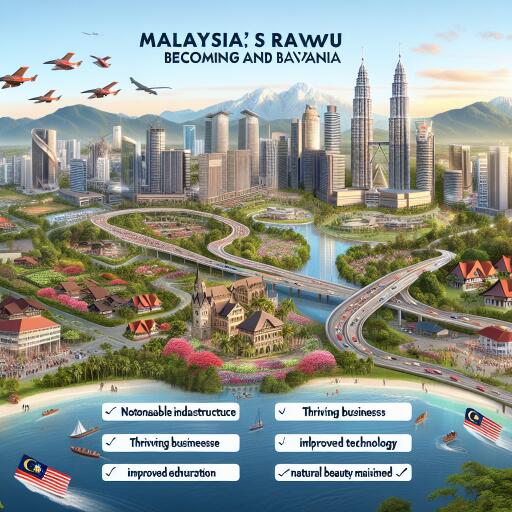
Sarawak’s Aspiration: The Drive towards Economic Prominence Inspired by Bavaria
In a transformative vision for Sarawak, Premier Tan Sri Abang Johari Tun Openg draws inspiration from Bavaria, Germany, aiming to position Sarawak as a pivotal economic force within Malaysia. Emphasizing the state’s potential parallels with Bavaria, he highlights the unique position Sarawak holds due to its robust economic framework and abundant natural resources.
Recent pivotal actions include the reclamation of Bintulu Port, acquisition of regional airline MASwings, and a significant stake in Affin Bank. These strategies signal the Premier’s ambition to escalate Sarawak’s economic and financial sectors, furthering its self-sufficiency and enhancing service to its populace.
The dissolution of the Barisan Nasional coalition post-2018 general elections led to the formation of the Gabungan Parti Sarawak (GPS) under Abang Johari’s leadership. This political stabilization has spearheaded Sarawak into an era of swift progress, focusing on substantial infrastructure projects to magnetize further investment. The announcement of Sarawak’s anticipated revenue surpassing RM13.3 billion in the upcoming year underlines the economic upliftment strategy.
Initiatives such as the establishment of a sovereign wealth fund and the construction of a new international airport in Kuching are intended to improve connectivity and reinforce Sarawak’s stature as a principal Malaysian state. Negotiations to regain sole natural gas trade rights mark a significant stride towards increased fiscal and administrative autonomy, reflecting a broader pursuit for empowerment within Malaysia.
The Premier’s aspirations don’t stop there. With aims set high for Sarawak to become Malaysia’s second-largest GDP contributor by 2026, this ambition is backed by an initiative to mirror global examples of infrastructure investment driving economic growth. This strategy encompasses enhancing domestic connectivity and attracting investments to foster mutual benefits for both investors and the Sarawak community.
Highlighting the importance of education in combating poverty, Abang Johari announces the advent of free tertiary education in state-owned universities by 2026. This educational initiative targets alleviating educational barriers, focusing on science and technology fields crucial for the state’s development goals, thus, aligning with the ambition to groom a skilled workforce for industries pivotal in economic growth.
Sarawak is also gearing towards a green future, leveraging its carbon-negative status achieved through a power generation mix dominant in hydro and gas. Plans to install floating solar panels on dams aim for a renewable energy output that could substantially exceed local demands, hinting at Sarawak’s role in a future Southeast Asian electricity grid, with ongoing endeavors to extend power supply to neighbouring regions, including Indonesia’s Kalimantan.
Moreover, Sarawak’s commitment to renewable energy is evident in negotiations to sell surplus renewable energy to Singapore, which includes laying undersea cables and the potential for investments in data centers within Sarawak. This cross-border energy trade reflects not only Sarawak’s green ambitions but also its growing strategic significance in Southeast Asia’s energy landscape.
As Sarawak embarks on these ambitious developments, its efforts to strengthen international and inter-regional collaborations denote a broader vision. Sarawak’s collaboration with Indonesia, particularly in contributing to the power supply of Kalimantan, and planning for enhanced connectivity with the new capital, Nusantara, exemplifies a forward-looking approach to regional economic cooperation and development.
In aligning Sarawak’s vision with examples of global economic triumphs, Premier Abang Johari’s strategies envision transforming Sarawak into a beacon of progress and sustainability in Asia, propelling it into a future of prosperity and innovation.





Leave a Reply